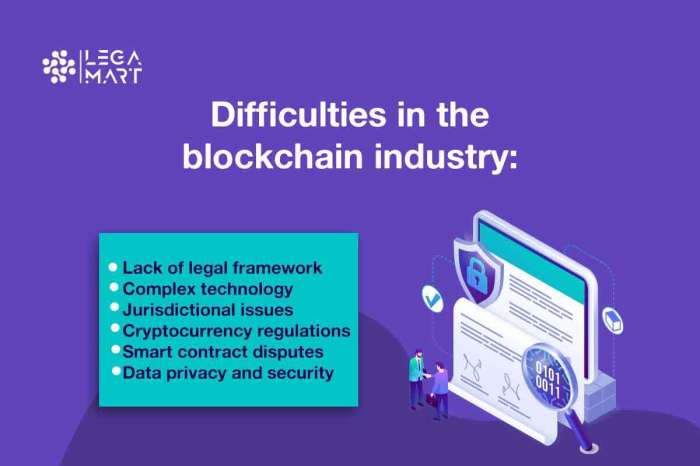Kicking off with How Blockchain Can Disrupt the Legal Industry, this topic is about to drop some serious knowledge bombs on how blockchain is shaking up the legal game. Brace yourself for a wild ride through the world of legal tech!
Introduction to Blockchain in the Legal Industry: How Blockchain Can Disrupt The Legal Industry
Blockchain technology has been making waves in various industries, offering a decentralized and secure way to record transactions. In simple terms, blockchain is a digital ledger that stores information in blocks linked together in a chain. Each block contains a unique cryptographic hash of the previous block, making it nearly impossible to alter the data without affecting the entire chain.
The legal industry faces numerous challenges, including issues with transparency, security, and efficiency. Blockchain technology has the potential to address these challenges by providing a secure and transparent way to store and verify legal documents, contracts, and transactions.
Examples of Blockchain Disruption in Other Industries
- Finance: Blockchain has revolutionized the financial sector by enabling faster and more secure cross-border transactions through cryptocurrencies like Bitcoin.
- Supply Chain Management: Companies are using blockchain to track products from manufacturing to delivery, ensuring authenticity and reducing the risk of counterfeiting.
- Healthcare: Blockchain is being utilized to securely store patient records, enabling healthcare providers to access accurate information quickly and efficiently.
Benefits of Implementing Blockchain in Legal Processes

Blockchain technology offers several advantages when integrated into legal workflows. By comparing traditional legal processes with blockchain-powered systems, we can see how this technology enhances efficiency, transparency, and security in legal operations.
Enhanced Security and Transparency
Blockchain provides a tamper-proof and decentralized system for storing data, making it highly secure and resistant to unauthorized alterations. This ensures that legal documents, contracts, and transactions are securely recorded and accessible only to authorized parties. The transparency of blockchain allows all involved parties to track changes and verify the authenticity of documents in real-time.
Efficiency in Document Management
With blockchain, legal professionals can streamline document management processes by eliminating the need for manual verification and paperwork. Smart contracts can automate tasks such as contract execution, payment processing, and compliance monitoring, reducing the time and resources required for legal procedures.
Cost Reduction and Time Savings
Implementing blockchain technology in legal processes can lead to significant cost reductions by eliminating intermediaries and reducing administrative overhead. By automating routine tasks and improving the speed of transactions, legal firms can save time and resources, allowing them to focus on more strategic and value-added activities.
Improved Trust and Accountability
Blockchain fosters trust among parties involved in legal transactions by providing a transparent and immutable record of all interactions. This increased trust leads to better collaboration, faster resolutions of disputes, and a more accountable legal system overall.
Smart Contracts and Decentralized Legal Systems

Smart contracts are self-executing contracts with the terms of the agreement directly written into lines of code. These contracts automatically enforce and execute themselves when predefined conditions are met. They eliminate the need for intermediaries and ensure transparency and efficiency in legal agreements.
Decentralized legal systems leverage blockchain technology to create a network of interconnected nodes that store and validate data. These systems operate without a central authority, providing a secure and tamper-proof environment for legal transactions. By decentralizing legal processes, traditional frameworks can be disrupted, reducing reliance on traditional institutions.
Automation of Legal Processes, How Blockchain Can Disrupt the Legal Industry
Smart contracts can automate various legal processes, such as contract management, dispute resolution, and compliance monitoring. For example, in real estate transactions, smart contracts can automatically transfer property ownership once payment is received, eliminating the need for intermediaries like lawyers or brokers. This streamlines the process, reduces costs, and minimizes the risk of errors or fraud.
Elimination of Intermediaries
Decentralized legal systems remove the need for intermediaries like lawyers, notaries, or escrow agents by enabling direct peer-to-peer interactions. This reduces transaction costs, speeds up the process, and increases accessibility to legal services. For instance, in supply chain management, smart contracts can track the flow of goods from manufacturer to consumer, ensuring transparency and accountability without the involvement of middlemen.
Enhanced Security and Trust
By leveraging blockchain technology, smart contracts provide enhanced security and trust in legal agreements. The decentralized nature of blockchain ensures that data is immutable and transparent, reducing the risk of fraud or manipulation. This increased level of security can revolutionize how legal contracts are drafted, executed, and enforced, leading to more efficient and reliable legal processes.
Security and Privacy Considerations in Legal Blockchain Applications
Blockchain technology offers numerous benefits for the legal industry, but ensuring security and privacy is crucial in implementing blockchain solutions. The sensitive nature of legal operations requires robust measures to protect data integrity and confidentiality.
Data Integrity and Confidentiality
- Blockchain’s decentralized nature enhances data integrity by storing information across a network of nodes, making it tamper-resistant.
- Smart contracts, self-executing agreements coded on the blockchain, help automate legal processes while ensuring transparency and accuracy.
- Encryption techniques are employed to secure data stored on the blockchain, safeguarding sensitive legal information from unauthorized access.
Challenges and Risks
- Despite its security features, blockchain is not immune to cyber threats, such as hacking or phishing attacks, which could compromise legal data.
- Ensuring compliance with data protection regulations, like GDPR, poses a challenge when implementing blockchain in legal practices due to the immutable nature of the technology.
- Managing access controls and permissions within a blockchain network is crucial to prevent unauthorized parties from viewing confidential legal documents.
Regulatory Landscape and Adoption Challenges

In the legal industry, the regulatory landscape plays a crucial role in the adoption of blockchain technology. Understanding the current regulations and overcoming adoption challenges are essential for integrating blockchain into legal processes.
Current Regulatory Environment for Blockchain in the Legal Industry
The legal industry is heavily regulated to ensure transparency, security, and compliance. When it comes to blockchain technology, regulators are still in the process of defining guidelines and regulations specific to its use in legal processes. Lack of clear regulations can create uncertainty and hinder widespread adoption.
Hurdles and Obstacles to Adoption by Legal Professionals
Legal professionals face various hurdles and obstacles when considering the adoption of blockchain technology. These may include concerns about data privacy, regulatory compliance, interoperability with existing systems, and the complexity of implementing blockchain solutions.
Strategies to Overcome Regulatory Barriers
- Educating regulators and legal professionals about the benefits of blockchain technology and its potential impact on legal processes.
- Collaborating with regulatory bodies to develop clear guidelines and frameworks for the use of blockchain in the legal industry.
- Implementing robust security and privacy measures to address regulatory concerns and build trust in blockchain solutions.
- Engaging in pilot projects and partnerships to demonstrate the effectiveness of blockchain in improving efficiency, transparency, and security in legal processes.